26届韩素音中文翻译
韩素音青翻译奖赛中文原文及参考译文和解析
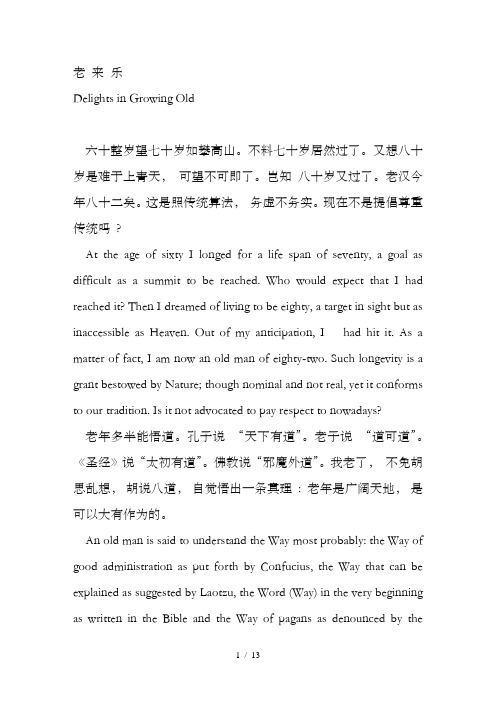
老来乐Delights in Growing Old六十整岁望七十岁如攀高山。
不料七十岁居然过了。
又想八十岁是难于上青天,可望不可即了。
岂知八十岁又过了。
老汉今年八十二矣。
这是照传统算法,务虚不务实。
现在不是提倡尊重传统吗?At the age of sixty I longed for a life span of seventy, a goal as difficult as a summit to be reached. Who would expect that I had reached it? Then I dreamed of living to be eighty, a target in sight but as inaccessible as Heaven. Out of my anticipation, I had hit it. As a matter of fact, I am now an old man of eighty-two. Such longevity is a grant bestowed by Nature; though nominal and not real, yet it conforms to our tradition. Is it not advocated to pay respect to nowadays?老年多半能悟道。
孔子说“天下有道”。
老子说“道可道”。
《圣经》说“太初有道”。
佛教说“邪魔外道”。
我老了,不免胡思乱想,胡说八道,自觉悟出一条真理: 老年是广阔天地,是可以大有作为的。
An old man is said to understand the Way most probably: the Way of good administration as put forth by Confucius, the Way that can be explained as suggested by Laotzu, the Word (Way) in the very beginning as written in the Bible and the Way of pagans as denounced by theBuddhists. As I am growing old, I can't help being given to flights of fancy and having my own Way of creating stories. However I have come to realize the truth: my old age serves as a vast world in which I can still have my talents employed fully and developed completely.七十岁开始可以诸事不做而拿退休金,不愁没有一碗饭吃,自由自在,自得其乐。
韩素音翻译大赛详解
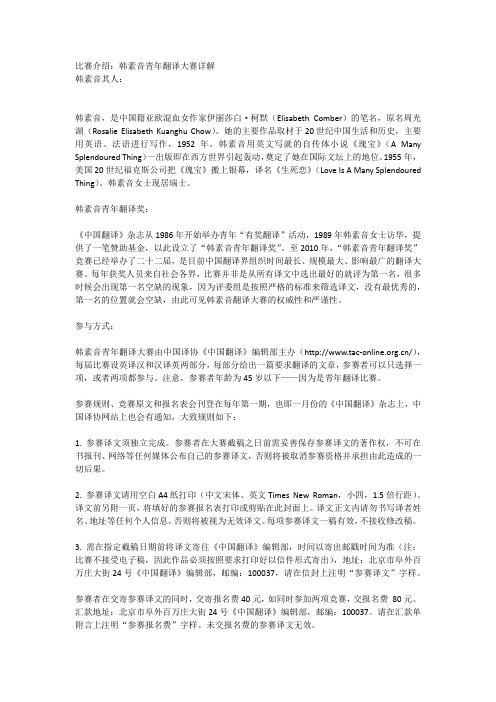
比赛介绍:韩素音青年翻译大赛详解韩素音其人:韩素音,是中国籍亚欧混血女作家伊丽莎白·柯默(Elisabeth Comber)的笔名,原名周光湖(Rosalie Elisabeth Kuanghu Chow)。
她的主要作品取材于20世纪中国生活和历史,主要用英语、法语进行写作,1952年,韩素音用英文写就的自传体小说《瑰宝》(A Many Splendoured Thing)一出版即在西方世界引起轰动,奠定了她在国际文坛上的地位。
1955年,美国20世纪福克斯公司把《瑰宝》搬上银幕,译名《生死恋》(Love Is A Many Splendoured Thing)。
韩素音女士现居瑞士。
韩素音青年翻译奖:《中国翻译》杂志从1986年开始举办青年“有奖翻译”活动,1989年韩素音女士访华,提供了一笔赞助基金,以此设立了“韩素音青年翻译奖”。
至2010年,“韩素音青年翻译奖”竞赛已经举办了二十二届,是目前中国翻译界组织时间最长、规模最大、影响最广的翻译大赛。
每年获奖人员来自社会各界,比赛并非是从所有译文中选出最好的就评为第一名,很多时候会出现第一名空缺的现象,因为评委组是按照严格的标准来筛选译文,没有最优秀的,第一名的位置就会空缺,由此可见韩素音翻译大赛的权威性和严谨性。
参与方式:韩素音青年翻译大赛由中国译协《中国翻译》编辑部主办(/),每届比赛设英译汉和汉译英两部分,每部分给出一篇要求翻译的文章,参赛者可以只选择一项,或者两项都参与。
注意,参赛者年龄为45岁以下——因为是青年翻译比赛。
参赛规则、竞赛原文和报名表会刊登在每年第一期,也即一月份的《中国翻译》杂志上,中国译协网站上也会有通知,大致规则如下:1. 参赛译文须独立完成。
参赛者在大赛截稿之日前需妥善保存参赛译文的著作权,不可在书报刊、网络等任何媒体公布自己的参赛译文,否则将被取消参赛资格并承担由此造成的一切后果。
2. 参赛译文请用空白A4纸打印(中文宋体、英文Times New Roman,小四,1.5倍行距)。
历届韩素音翻译大奖赛竞赛原文及译文详解
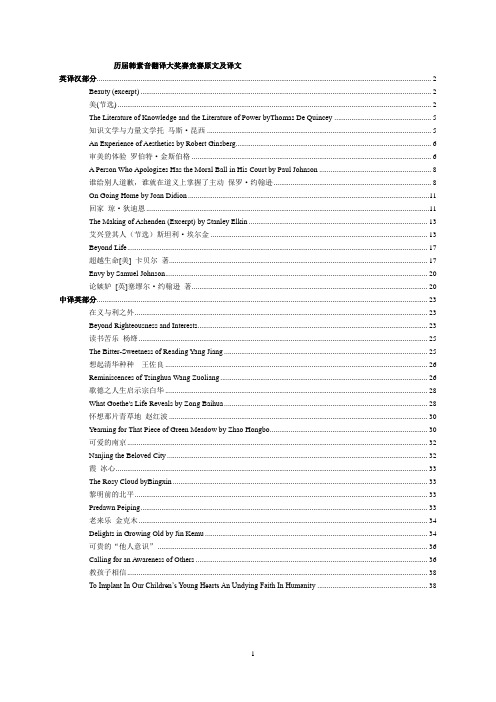
历届韩素音翻译大奖赛竞赛原文及译文英译汉部分 (2)Beauty (excerpt) (2)美(节选) (2)The Literature of Knowledge and the Literature of Power byThomas De Quincey (5)知识文学与力量文学托马斯.昆西 (5)An Experience of Aesthetics by Robert Ginsberg (6)审美的体验罗伯特.金斯伯格 (6)A Person Who Apologizes Has the Moral Ball in His Court by Paul Johnson (8)谁给别人道歉,谁就在道义上掌握了主动保罗.约翰逊 (8)On Going Home by Joan Didion (11)回家琼.狄迪恩 (11)The Making of Ashenden (Excerpt) by Stanley Elkin (13)艾兴登其人(节选)斯坦利.埃尔金 (13)Beyond Life (17)超越生命[美] 卡贝尔著 (17)Envy by Samuel Johnson (20)论嫉妒[英]塞缪尔.约翰逊著 (20)中译英部分 (23)在义与利之外 (23)Beyond Righteousness and Interests (23)读书苦乐杨绛 (25)The Bitter-Sweetness of Reading Yang Jiang (25)想起清华种种王佐良 (26)Reminiscences of Tsinghua Wang Zuoliang (26)歌德之人生启示宗白华 (28)What Goethe's Life Reveals by Zong Baihua (28)怀想那片青草地赵红波 (30)Yearning for That Piece of Green Meadow by Zhao Hongbo (30)可爱的南京 (32)Nanjing the Beloved City (32)霞冰心 (33)The Rosy Cloud byBingxin (33)黎明前的北平 (33)Predawn Peiping (33)老来乐金克木 (34)Delights in Growing Old by Jin Kemu (34)可贵的“他人意识” (36)Calling for an Awareness of Others (36)教孩子相信 (38)To Implant In Our Children’s Young Hearts An Undying Faith In Humanity (38)英译汉部分Beauty (excerpt)美(节选)Judging from the scientists I know, including Eva and Ruth, and those whom I've read about, you can't pursue the laws of nature very long without bumping撞倒; 冲撞into beauty. “I don't know if it's the same beauty you see in the sunset,”a friend tells me, “but it feels the same.”This friend is a physicist, who has spent a long career deciphering破译(密码), 辨认(潦草字迹) what must be happening in the interior of stars. He recalls for me this thrill on grasping for the first time Dirac's⑴equations describing quantum mechanics, or those o f Einstein describing relativity. “They're so beautiful,” he says, “you can see immediately they have to be true. Or at least on the way toward truth.” I ask him what makes a theory beautiful, and he replies, “Simplicity, symmetry .对称(性); 匀称, 整齐, elegance, and power.”我结识一些科学家(包括伊娃和露丝),也拜读过不少科学家的著作,从中我作出推断:人们在探求自然规律的旅途中,须臾便会与美不期而遇。
韩素音英语竞赛24-27届原文
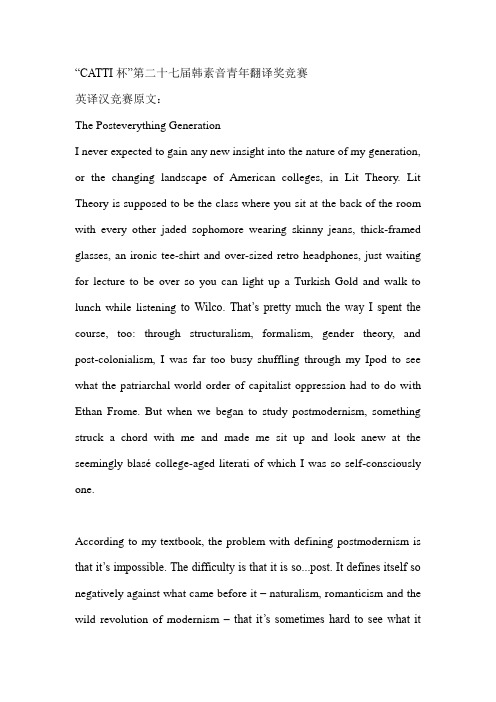
―CATTI杯‖第二十七届韩素音青年翻译奖竞赛英译汉竞赛原文:The Posteverything GenerationI never expected to gain any new insight into the nature of my generation, or the changing landscape of American colleges, in Lit Theory. Lit Theory is supposed to be the class where you sit at the back of the room with every other jaded sophomore wearing skinny jeans, thick-framed glasses, an ironic tee-shirt and over-sized retro headphones, just waiting for lecture to be over so you can light up a Turkish Gold and walk to lunch while listening to Wilco. That‘s pretty much the way I spent the course, too: through structuralism, formalism, gender theory, and post-colonialism, I was far too busy shuffling through my Ipod to see what the patriarchal world order of capitalist oppression had to do with Ethan Frome. But when we began to study postmodernism, something struck a chord with me and made me sit up and look anew at the seemingly blasé college-aged literati of which I was so self-consciously one.According to my textbook, the problem with defining postmodernism is that it‘s impossible. The difficulty is that it is so...post. It defines itself so negatively against what came before it – naturalism, romanticism and the wild revolution of modernism –that it‘s sometimes hard to see what itactually is. It denies that anything can be explained neatly or even at all. It is parodic, detached, strange, and sometimes menacing to traditionalists who do not understand it. Although it arose in the post-war west (the term was coined in 1949), the generation that has witnessed its ascendance has yet to come up with an explanation of what postmodern attitudes mean for the future of culture or society. The subject intrigued me because, in a class otherwise consumed by dead-letter theories, postmodernism remained an open book, tempting to the young and curious. But it also intrigued me because the question of what postmodernism –what a movement so post-everything, so reticent to define itself – is spoke to a larger question about the political and popular culture of today, of the other jaded sophomores sitting around me who had grown up in a postmodern world.In many ways, as a college-aged generation, we are also extremely post: post-Cold War, post-industrial, post-baby boom, post-9/11...at one point in his fa mous essay, ―Postmodernism, or the Cultural Logic of Late Capitalism,‖ literary critic Frederic Jameson even calls us ―post-literate.‖ We are a generation that is riding on the tail-end of a century of war and revolution that toppled civilizations, overturned repressive social orders, and left us with more privilege and opportunity than any other society in history. Ours could be an era to accomplish anything.And yet do we take to the streets and the airwaves and say ―here we are, and this is what we dema nd‖? Do we plant our flag of youthful rebellion on the mall in Washington and say ―we are not leaving until we see change! Our eyes have been opened by our education and our conception of what is possible has been expanded by our privilege and we demand a better world because it is our right‖? It would seem we do the opposite. We go to war without so much as questioning the rationale, we sign away our civil liberties, we say nothing when the Supreme Court uses Brown v. Board of Education to outlaw segregation, and we sit back to watch the carnage on the evening news.On campus, we sign petitions, join organizations, put our names on mailing lists, make small-money contributions, volunteer a spare hour to tutor, and sport an entire wardrobe‘s worth of Live S trong bracelets advertising our moderately priced opposition to everything from breast cancer to global warming. But what do we really stand for? Like a true postmodern generation we refuse to weave together an overarching narrative to our own political consciousness, to present a cast of inspirational or revolutionary characters on our public stage, or to define a specific philosophy. We are a story seemingly without direction or theme, structure or meaning –a generation defined negatively againstwhat ca me before us. When Al Gore once said ―It‘s the combination of narcissism and nihilism that really defines postmodernism,‖ he might as well have been echoing his entire generation‘s critique of our own. We are a generation for whom even revolution seems trite, and therefore as fair a target for blind imitation as anything else. We are the generation of the Che Geuvera tee-shirt.Jameson calls it ―Pastiche‖ –―the wearing of a linguistic mask, speech in a dead language.‖ In literature, this means an author s peaking in a style that is not his own – borrowing a voice and continuing to use it until the words lose all meaning and the chaos that is real life sets in. It is an imitation of an imitation, something that has been re-envisioned so many times the original model is no longer relevant or recognizable. It is mass-produced individualism, anticipated revolution. It is why postmodernism lacks cohesion, why it seems to lack purpose or direction. For us, the post-everything generation, pastiche is the use and reuse of the old clichés of social change and moral outrage – a perfunctory rebelliousness that has culminated in the age of rapidly multiplying non-profits and relief funds. We live our lives in masks and speak our minds in a dead language – the language of a society that expects us to agitate because that‘s what young people do. But how do we rebel against a generation that is expecting, anticipating, nostalgic for revolution?How do we rebel against parents that sometimes seem to want revolution more than we do? We don‘t. We rebel by not rebelling. We wear the defunct masks of protest and moral outrage, but the real energy in campus activism is on the internet, with websites like . It is in the rapidly developing ability to communicate ideas and frustration in chatrooms instead of on the streets, and channel them into nationwide projects striving earnestly for moderate and peaceful change: we are the generation of Students Taking Action Now Darfur; we are the Rock the V ote generation; the generation of letter-writing campaigns and public interest lobbies; the alternative energy generation.College as America once knew it –as an incubator of radical social change –is coming to an end. To our generation the word ―radicalism‖ evokes images of al Qa eda, not the Weathermen. ―Campus takeover‖ sounds more like Virginia Tech in 2007 than Columbia University in 1968. Such phrases are a dead language to us. They are vocabulary from another era that does not reflect the realities of today. However, the technological revolution, the revolution, the revolution of the organization kid, is just as real and just as profound as the revolution of the 1960‘s – it is just not as visible. It is a work in progress, but it is there. Perhaps when our parents finally stop pointing out the things that we arenot, the stories that we do not write, they will see the threads of our narrative begin to come together; they will see that behind our pastiche, the post generation speaks in a language that does make sense. We are writing a revolution. We are just putting it in our own words.汉译英竞赛原文:保护古村落就是保护―根性文化‖传统村落是指拥有物质形态和非物质形态文化遗产,具有较高的历史、文化、科学、艺术、社会、经济价值的村落。
2022韩素音国际翻译大赛(英译汉)二等奖译文
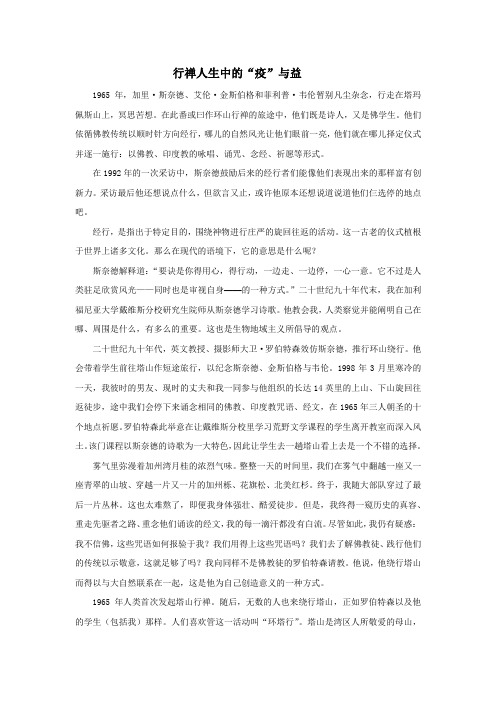
行禅人生中的“疫”与益1965年,加里·斯奈德、艾伦·金斯伯格和菲利普·韦伦暂别凡尘杂念,行走在塔玛佩斯山上,冥思苦想。
在此番或曰作环山行禅的旅途中,他们既是诗人,又是佛学生。
他们依循佛教传统以顺时针方向经行,哪儿的自然风光让他们眼前一亮,他们就在哪儿择定仪式并逐一施行:以佛教、印度教的咏唱、诵咒、念经、祈愿等形式。
在1992年的一次采访中,斯奈德鼓励后来的经行者们能像他们表现出来的那样富有创新力。
采访最后他还想说点什么,但欲言又止,或许他原本还想说道说道他们仨选停的地点吧。
经行,是指出于特定目的,围绕神物进行庄严的旋回往返的活动。
这一古老的仪式植根于世界上诸多文化。
那么在现代的语境下,它的意思是什么呢?斯奈德解释道:“要诀是你得用心,得行动,一边走、一边停,一心一意。
它不过是人类驻足欣赏风光——同时也是审视自身——的一种方式。
”二十世纪九十年代末,我在加利福尼亚大学戴维斯分校研究生院师从斯奈德学习诗歌。
他教会我,人类察觉并能阐明自己在哪、周围是什么,有多么的重要。
这也是生物地域主义所倡导的观点。
二十世纪九十年代,英文教授、摄影师大卫·罗伯特森效仿斯奈德,推行环山绕行。
他会带着学生前往塔山作短途旅行,以纪念斯奈德、金斯伯格与韦伦。
1998年3月里寒冷的一天,我彼时的男友、现时的丈夫和我一同参与他组织的长达14英里的上山、下山旋回往返徒步,途中我们会停下来诵念相同的佛教、印度教咒语、经文,在1965年三人朝圣的十个地点祈愿。
罗伯特森此举意在让戴维斯分校里学习荒野文学课程的学生离开教室而深入风土。
该门课程以斯奈德的诗歌为一大特色,因此让学生去一趟塔山看上去是一个不错的选择。
雾气里弥漫着加州湾月桂的浓烈气味。
整整一天的时间里,我们在雾气中翻越一座又一座青翠的山坡、穿越一片又一片的加州栎、花旗松、北美红杉。
终于,我随大部队穿过了最后一片丛林。
这也太难熬了,即便我身体强壮、酷爱徒步。
第二十七届韩素音青年翻译奖竞赛原文
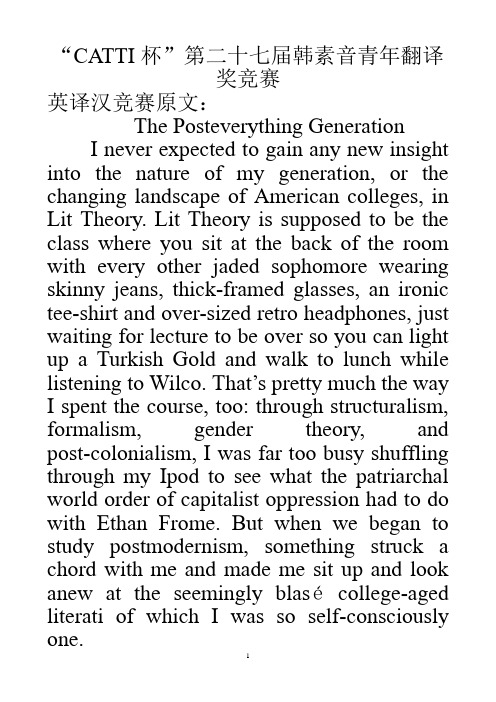
“CATTI杯”第二十七届韩素音青年翻译奖竞赛英译汉竞赛原文:The Posteverything GenerationI never expected to gain any new insight into the nature of my generation, or the changing landscape of American colleges, in Lit Theory. Lit Theory is supposed to be the class where you sit at the back of the room with every other jaded sophomore wearing skinny jeans, thick-framed glasses, an ironic tee-shirt and over-sized retro headphones, just waiting for lecture to be over so you can light up a Turkish Gold and walk to lunch while listening to Wilco. That’s pretty much the way I spent the course, too: through structuralism, formalism, gender theory, and post-colonialism, I was far too busy shuffling through my Ipod to see what the patriarchal world order of capitalist oppression had to do with Ethan Frome. But when we began to study postmodernism, something struck a chord with me and made me sit up and look anew at the seemingly blasécollege-aged literati of which I was so self-consciously one.According to my textbook, the problem with defining postmodernism is that it’s impossible. The difficulty is that it is so...post. It defines itself so negatively against what came before it –naturalism, romanticism and the wild revolution of modernism –that it’s sometimes hard to see what it actually is. It denies that anything can be explained neatly or even at all. It is parodic, detached, strange, and sometimes menacing to traditionalists who do not understand it. Although it arose in the post-war west (the term was coined in 1949), the generation that has witnessed its ascendance has yet to come up with an explanation of what postmodern attitudes mean for the future of culture or society. The subject intrigued me because, in a class otherwise consumed by dead-letter theories, postmodernism remained an open book, tempting to the young and curious. But it also intrigued me because the question of what postmodernism –what a movement so post-everything, so reticent to define itself –is spoke to a larger question about the political and popular culture of today, of the other jaded sophomores sitting around mewho had grown up in a postmodern world.In many ways, as a college-aged generation, we are also extremely post: post-Cold War, post-industrial, post-baby boom, post-9/11...at one point in his famous essay, “Postmodernism, or the Cultural Logic of Late Capitalism,”literary critic Frederic Jameson even calls us “post-literate.” We are a generation that is riding on the tail-end of a century of war and revolution that toppled civilizations, overturned repressive social orders, and left us with more privilege and opportunity than any other society in history. Ours could be an era to accomplish anything.And yet do we take to the streets and the airwaves and say “here we are, and this is what we demand”? Do we plant our flag of youthful rebellion on the mall in Washington and say “we are not leaving until we see change! Our eyes have been opened by our education and our conception of what is possible has been expanded by our privilege and we demand a better world because it is our right”? It would seem we do the opposite. We go to war without so much as questioning the rationale, we sign away our civil liberties,we say nothing when the Supreme Court uses Brown v. Board of Education to outlaw desegregation, and we sit back to watch the carnage on the evening news.On campus, we sign petitions, join organizations, put our names on mailing lists, make small-money contributions, volunteer a spare hour to tutor, and sport an entire wardrobe’s worth of Live Strong bracelets advertising our moderately priced opposition to everything from breast cancer to global warming. But what do we really stand for? Like a true postmodern generation we refuse to weave together an overarching narrative to our own political consciousness, to present a cast of inspirational or revolutionary characters on our public stage, or to define a specific philosophy. We are a story seemingly without direction or theme, structure or meaning –a generation defined negatively against what came before us. When Al Gore once said “It’s the combination of narcissism and nihilism that really defines postmodernism,” he might as well have been echoing his entire generation’s critique of our own. We are a generation for whom evenrevolution seems trite, and therefore as fair a target for bland imitation as anything else. We are the generation of the Che Geuvera tee-shirt.Jameson calls it “Pastiche”–“the wearing of a linguistic mask, speech in a dead language.” In literature, this means an author speaking in a style that is not his own –borrowing a voice and continuing to use it until the words lose all meaning and the chaos that is real life sets in. It is an imitation of an imitation, something that has been re-envisioned so many times the original model is no longer relevant or recognizable. It is mass-produced individualism, anticipated revolution. It is why postmodernism lacks cohesion, why it seems to lack purpose or direction. For us, the post-everything generation, pastiche is the use and reuse of the old clichés of social change and moral outrage –a perfunctory rebelliousness that has culminated in the age of rapidly multiplying non-profits and relief funds. We live our lives in masks and speak our minds in a dead language –the language of a society that expects us to agitate because that’s whatyoung people do. But how do we rebel against a generation that is expecting, anticipating, nostalgic for revolution?How do we rebel against parents that sometimes seem to want revolution more than we do? We don’t. We rebel by not rebelling. We wear the defunct masks of protest and moral outrage, but the real energy in campus activism is on the internet, with websites like . It is in the rapidly developing ability to communicate ideas and frustration in chatrooms instead of on the streets, and channel them into nationwide projects striving earnestly for moderate and peaceful change: we are the generation of Students Taking Action Now Darfur; we are the Rock the V ote generation; the generation of letter-writing campaigns and public interest lobbies; the alternative energy generation.College as America once knew it –as an incubator of radical social change –is coming to an end. To our generation the word “radicalism”evokes images of al Qaeda, not the Weathermen. “Campus takeover”sounds more like Virginia Tech in 2007 than Columbia University in 1968. Such phrasesare a dead language to us. They are vocabulary from another era that does not reflect the realities of today. However, the technological revolution, the revolution, the revolution of the organization kid, is just as real and just as profound as the revolution of the 1960’s –it is just not as visible. It is a work in progress, but it is there. Perhaps when our parents finally stop pointing out the things that we are not, the stories that we do not write, they will see the threads of our narrative begin to come together; they will see that behind our pastiche, the post generation speaks in a language that does make sense. We are writing a revolution. We are just putting it in our own words.汉译英竞赛原文:保护古村落就是保护“根性文化”传统村落是指拥有物质形态和非物质形态文化遗产,具有较高的历史、文化、科学、艺术、社会、经济价值的村落。
第二十二届韩素音青年翻译奖竟赛英译汉译文和译文评析

英译汉Hidden Within Technology’s Empire, a Republic of Letters隐藏于技术帝国的文学界索尔•贝妻When I was a boy “discovering literature”, I used to think how wonderful it would be if every other person on the street were familiar with Proust and Joyce or T. E. Lawrence or Pasternak and Kafka. Later I learned how refractory to high culture the democratic masses were. Lincoln as a young frontiersman read Plutarch, Shakespeare and the Bible. But then he was Lincoln.我还是个"探索文学"的少年时,就经常在想:要是大街上人人都熟悉普鲁斯特和乔伊斯,熟悉T.E.劳伦斯,熟悉帕斯捷尔纳克和卡夫卡,该有多好啊!后来才知道,平民百姓对高雅文化有多排斥。
虽说少年时代身居边陲的林肯就在阅读普鲁塔克,、莎士比亚和《圣经》,但他毕竟是林肯。
Later when I was traveling in the Midwest by car, bus and train, I regularly visited small-town libraries and found that readers in Keokuk, Iowa, or Benton Harbor, Mich., were checking out Proust and Joyce and even Svevo and Andrei Biely. D. H. Lawrence was also a favorite. And sometimes I remembered that God was willing to spare Sodom for the sake of 10 of the righteous. Not that Keokuk was anything like wicked Sodom, or that Proust’s Charlus would have been tempted to settle in Benton Harbor, Mich. I seem to have had a persistent democratic desire to find evidences of high culture in the most unlikely places.后来,我坐小车、巴士和火车在中西部旅行,经常走访小镇图书馆;发现在衣阿华州基奥卡克市,或者密歇根州本顿港市,读者们借阅普鲁斯特和乔伊斯的作品,甚至还有斯维沃@和安德烈•别雷®的著作。
翻译家介绍精美ppt--韩素音
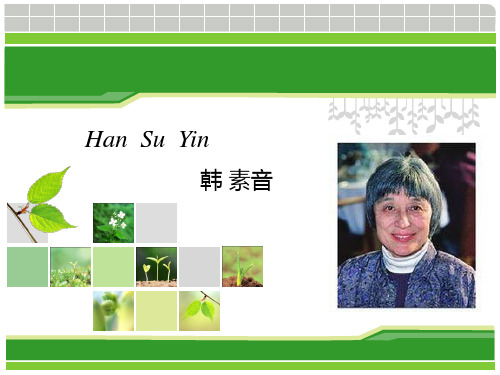
清平乐· 六盘山
High is the sky and clear the clouds, the eye follows the wild goose winging southward 天高云淡,望断南飞雁。 If we do not reach the great wall, we are not men. Already we count on our fingers a match of 10,000 lis. 不到长城非好汉,屈指行程二万。 On the crest of LiuPan our banners waft, in the west wind. 六盘山上高峰,红旗漫卷西风。 Today we hold in our hands the long rope to bind the dragon, when shall we bind fast the grey dragon. 今日长缨在手,何时缚住苍龙?
社会活动
1989资助举办韩 素音翻译大赛 先后出版40多部著 作,有自传和小说
所获荣誉
《瑰宝》轰动欧美 文坛,改编成电影 生死恋获得三项奥 斯卡奖 1994“理解与友谊 国际文学奖” 1996“中国人民友 好使者” “了解中国历史和 现实的主要入门”
用积蓄设立了5项 奖金
曾为毛泽东周恩来 立传
沁 园 春 —— 长 沙
Alone, standing in autumn’s chill As the Xiang River Flow north past Orange Island, I see the red-stained forests trooping. On the lucid blue water a hundred barges sail, Eagles fly above, fish glide in the deeps, Under the unmoving sky, all living things strive for freedom. I ponder and ask the boundless earth Who masters the destiny? In past years, I walked here with many companions, Friends of crowded years and moths of endeavor, All of us students, all of us young, In high assurance, strong and fearless, Pointing the fingers at the things, Praising and condemning in our writings, The highest in the land we counted no more than dust But, do you remember? How, reaching midstream, we struck the water And the waves dashing against our speeding boats.
- 1、下载文档前请自行甄别文档内容的完整性,平台不提供额外的编辑、内容补充、找答案等附加服务。
- 2、"仅部分预览"的文档,不可在线预览部分如存在完整性等问题,可反馈申请退款(可完整预览的文档不适用该条件!)。
- 3、如文档侵犯您的权益,请联系客服反馈,我们会尽快为您处理(人工客服工作时间:9:00-18:30)。
城市的迷失
沿着瑗珲—腾冲线,这条1935年由胡焕庸先生发现并命名的中国人口、自然和历史地理的分界线,我们看到,从远距离贸易发展开始的那天起,利益和权力的渗透与分散,已经从根本结构上改变了城市的状态:城市在膨胀,人在疏离。
里尔的阿兰(Alain)的话到今天仍然振聋发聩:“金钱万能,不是凯撒万能。
”
Along the Line of Aihui and Tengchong, an invisible line discovered and named by Hu Huanyong in 1935 aimed at dividing the population, nature, history and geography of China, we can see that the permeation of interest and power has changed the status of city on its basic structure since the beginning day of long-distance trade, namely, the city was growing while people in it resulted in alienation. What Alain of Lille said still enlightened us that it’s the money who talks instead of Caesar.
在古罗马,柱子是按照人的比例划分的;到了文艺复兴时期,人就是世界上最美好的尺度。
今天的中国城市里,裁弯取直的河渠,向四面八方扩张的交通,膨胀硕大的以便于接纳更多商业行为的城市广场与建筑立面,都在告诉人们建设背后的权力与资本才是审美标准。
直到有一天,回过头来看到自己的孩子站在为车辆交通铺开的、满是尘土的路上,我们才发现,城市的大,却容不下一个让孩子们展开笑颜的机会。
In ancient Rome, pillars were designated according to the proportion of human body; while in the Renaissance, human acted as the most beautiful measure in the world. In the current Chinese cities, we see rivers got rechanneled to flow straightly, transportation system got expanded into all directions, urban plaza and building facade got designated larger and larger to accommodate more business actions. All of this have been telling us that the real aesthetical standard is the power and capital behind these constructions. Only in that day when we notice that our own children stand on lanes prepared for vehicles and covered with thick dust, we realize the city is so generous but can not give a chance for children to smile.
规划和设计的弊病,不在于追求利益这件事情本身,而在于追求利益和权利时的鬼迷心窍,把人类其他的需要都忘记得一干二净。
城市数量在变多、规模在扩大、城乡结构在解体,但城市的性质和目的,却被忘却了:最聪明的人不再懂得社会生活的形式,而最无知的人却准备去建设社会生活的形式。
It’s not bad just for interest to plan and design, but bad for completely ignoring the other needs of human in the blind pursuit of interest and power. While people witness that the city is growing in number and scale, and the urban and rural
structure is disintegrating, people, however, forget what the nature of city lie in and what city aims at. The most intelligent people no longer understand how to get involved into social life, and the most ignorant people are planning to create new way of social life.
城市大了,人小了。
人们和他们的城市息息相关而又格格不入。
人们不能获得有悖于商业世界、内容更充实更满意的生活手段,成为了旁观者、读者、听众和消极的观察者。
于是,我们年复一年不是真正地生活着,而是间接地生活着,远离内在的本性。
这些本性,掠过照片沉默和迷茫的脸孔,偶然从天空飘过的风筝看到,偶然从孩子们看到鸽子时脸上的笑靥看到。
The cities grow big while people’s hearts turn oppositely. We are closely connected with cities but at meantime against. We can not live in a fully satisfied and contented way that goes against business world, and can only look on the world, read the world, listen to the world and negatively observe the world. We, thereby year after year, are not really living, but indirectly living and being away from our inner nature. These nature, disappearing from silent photos and confused faces, could occasionally be found on a kite flying in the sky, or on some smiling faces of children at sight of doves.
人与城市的分离,让人无所适从;让人欣慰的是,大家都没有忘记
要生活这件事。
城市最早作为神祗的家园,代表了永恒的价值、安慰和神的力量。
过去人与人的隔离与区别,将不能维持下去;城市最终体现的不再是一个神化了的统治者的意志,而是城市每一个个体和全体的意志;它不再是冲突本身,而成为了为日常生活的矛盾与冲突、挑战与拥抱提供生动舞台的容器;艺术与思想有一天也能闪现在城市的角落,与人们的生活相交织。
也许到了这一天,我们才能真正说,城市让生活更美好。
The separation between human and city leaves people at loose ends; while what comforts us is that nobody forget to live. City, initially regarded as the home of deity, represents the eternal values, comforts and power of god. People will never be separated and differentiated just like in the old days; finally city will not reflect the deified wills of rulers but will show the wills of individual and the whole of city; it is not about conflict any more, but turns to be a stage accommodating contradiction and conflict happened in our daily life, as well as challenges and hugs; maybe one day art and thought would gradually flourish in cities and become closely connected with people’s lives. Perhaps only in that day can we truly say that city makes life better.。
